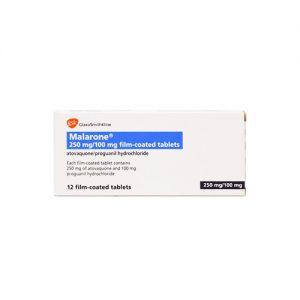Showing 1 products
Pagination
What is malaria?
Malaria can be a life-threatening illness that is found predominately in tropical and subtropical countries. The parasite known as plasmodium is transmitted by mosquito. A person can contract malaria when they are bitten by the parasite laden mosquito. Once in your blood stream it rapidly multiples. Its effect may become apparent within a few days, in some patients and depending on the parasite involved there is a latency period and symptoms can start many weeks after contracting the parasite.
What causes malaria?
Malaria is caused by the parasite 'plasmodium', this is a s single-celled organism that is transmitted to humans from the anopheles mosquito bite.
There are numerous plasmodium parasites that have been identified by microbiologist, however, only five are thought to infect humans.
What are the symptoms of malaria?
Incubation period after the initial bite varies on the strain of plasmodium, it ranges from 9 days to 40days.
The first phase is a ‘flu-like; symptoms: fever, lethargy, generalised muscle aches.
The parasite begins invading red blood cells and destroying them. This causes the more severe fevers, rigors, chills, fatigue, abdominal cramps.
Because of the loss of red blood cells, malaria can also lead to jaundice and anaemia,
Certain cases have also reported back pain and an enlarged spleen.
Less likely symptoms are kidney failure, seizures, reduced mental capacity and coma.
Which areas are most affected by malaria?
Malaria is most common in tropical and subtropical countries, where the anopheles mosquito thrives. Malaria Hotpots around the globe are:
- Middle East
- North Africa
- Sub-Saharan Africa
- Central and South America
- The Caribbean
- Central Asia
- Oceania (pacific islands)
How to prevent malaria
Prevention, prevention, prevention.
Barriers:
Repellent creams-contain DEET (diethyltoluamide).
Sunscreens that can prevent against insect bites
Mosquito nets treated with insecticide
Prophylactic medication:
Prescribed medication to prevent malaria
How is malaria treated?
Malaria tablets work by preventing the multiplication of the plasmodium parasite. This gives your body a chance to then fight the parasite.
It is important to note that all anti-malarial medications need to be started before you leave for your holiday and often for a short period of time after returning.
Which malaria treatments are available?
Access Doctor offer effective antimalarial treatments to suit your needs including
Malarone and Doxycycline.
If you require additional help feel free to contact us for further information.
Further information can also be found in the NHS website.
https://www.nhs.uk/conditions/malaria/treatment/




We’re here to help.
Our friendly team is available to help Monday to Friday 9:00am - 5:00pm.
If you need urgent assistance, do not use this service. Call 111, or in an emergency call 999.

